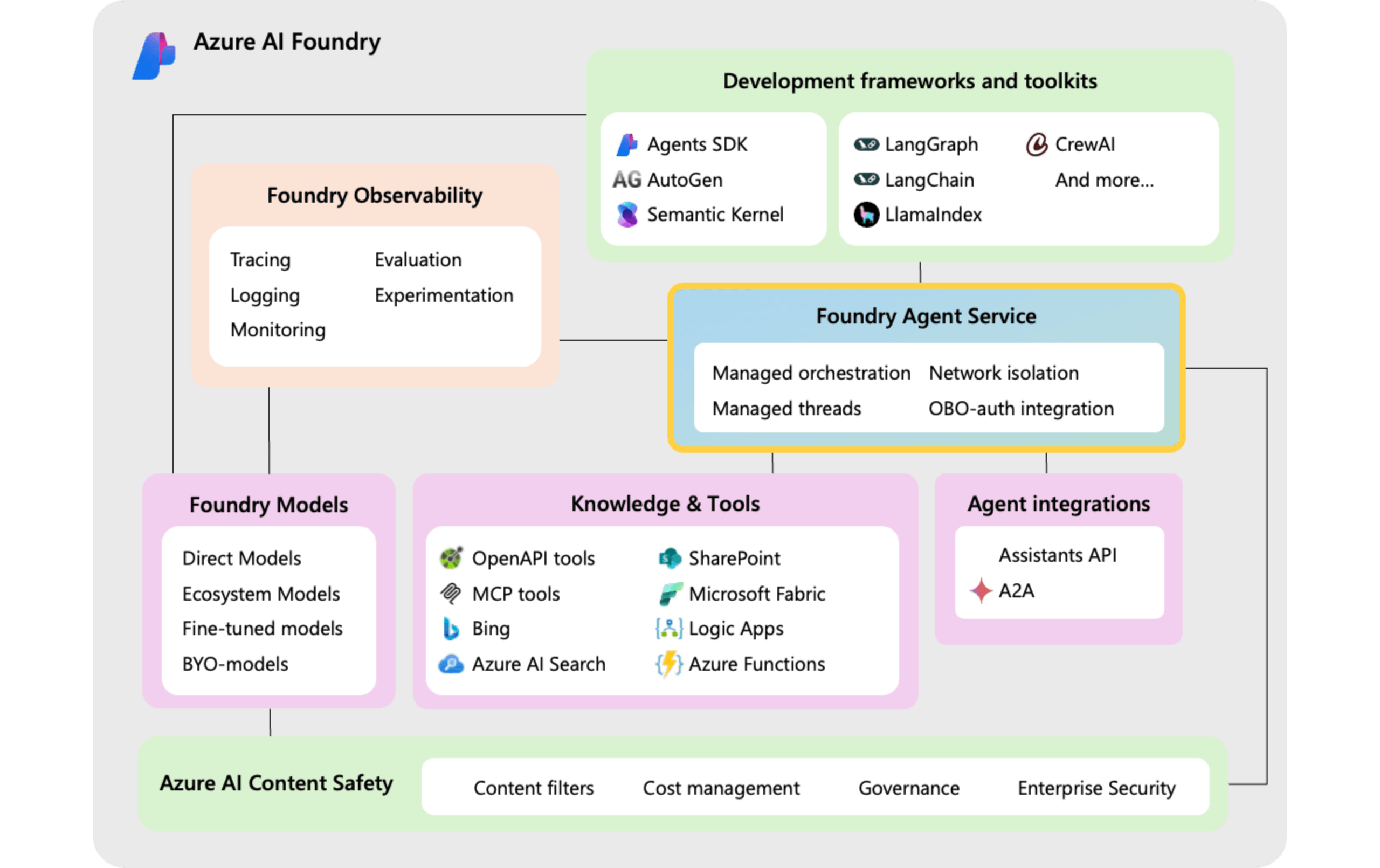Azure AI Foundry Agent Service GA Introduces Multi-Agent Orchestration and Open Interoperability

MMS • Steef-Jan Wiggers
Microsoft recently announced the general availability (GA) of the Azure AI Foundry Agent Service at its annual Build conference, a flexible, use-case-agnostic platform for building, deploying, and managing AI agents, designed as microservices (benefiting from modularity and scalability), for a wide range of applications.
The company first introduced the service at Ignite as Azure AI Agent Service, which sits within Azure AI Foundry, allowing developers to create and run an agent using either OpenAI SDKs or Azure AI Foundry SDKs with just a few lines of code. It was later available in public preview in the Azure AI Foundry SDK and the Azure AI Foundry portal. Moreover, with the GA release, the company states that it is introducing several powerful new features and integrations that make it even easier for developers to build and scale their agent solutions.

(Source: Microsoft Learn documentation)
One of the key enhancements in the GA release is the robust support for Multi-Agent Orchestration that coordinates specialized agents to perform structured, long-running tasks. The orchestration capability is built around two core components: first, Connected Agents (preview) enable point-to-point interactions, allowing agents to call upon other specialized agents as tools for task delegation, modular processing, and context-specific workflows where each contributes independently to the solution; and second, Multi-Agent Workflows (preview) offer a structured, stateful orchestration layer that coordinates multiple agents through complex, multi-step processes by handling context management, error recovery, and long-running durability, making them ideal for scenarios requiring agents to maintain context across multiple steps, like customer onboarding or supply chain automation.
The Foundry Agent Service integrates directly with the converged runtime for Semantic Kernel and AutoGen to support advanced multi-agent orchestration.
Recognizing that AI agents thrive within interconnected ecosystems, the GA release of Azure AI Foundry Agent Service strongly emphasizes open and interoperable tools. Developers can now leverage the extensive library of over 1,400 Azure Logic Apps workflows as tools for their agents, enabling seamless automation of complex business processes and even triggering agents directly from Logic Apps.
Furthermore, the platform significantly expands its knowledge integration capabilities by adding SharePoint as a first-party tool alongside Microsoft Fabric and Bing Search, providing agents with richer, context-aware insights. The ecosystem is further enriched through access to a growing catalog of partner tools from various domains and a library of reusable agent code samples from Microsoft and the community, accelerating development and expanding agent capabilities.
A key aspect of this open approach is the introduction of the Agent2Agent (A2A) API head, which enables interoperability with other agent platforms – allowing open-source orchestrators with A2A connectors to utilize Foundry Agent Service agents without requiring custom integrations, facilitating multi-turn conversations between diverse agents. Moreover, the commitment to open protocols extends to multi-cloud scenarios, allowing developers to connect Foundry agents with agents from platforms like SAP Joule and Google Vertex AI. Furthermore, Azure AI Foundry Agent Service integrates with popular agent orchestration frameworks like Crew AI, LangGraph, and LlamaIndex.
In addition, the GA release of Azure AI Foundry Agent Service incorporates robust features for evaluation, monitoring (AgentOps), governance, and safety. Built-in evaluation tools allow developers to assess agent performance across key metrics like accuracy and efficiency. At the same time, integrated tracing provides detailed insights into agent processing workflows for optimization.
Daniel Christian, a Microsoft MVP and certified trainer, emphasized this open approach on X:
Models, Models, everywhere, but they are all available to connect with the Azure AI Foundry Agent Service.
In addition, Jiadong Chen, a Cloud architect and Microsoft MVP, tweeted:
AI agents are quietly transforming industries. With Azure AI Foundry and Azure AI Agent Service, businesses deploy LLM-powered multi-agent systems to handle everything from real-time analytics to customer interactions. Picture a retail chain using AI agents to predict inventory shortages or a hospital automating patient triage — all while Azure’s scalable infrastructure keeps data secure. The result? Productivity spikes, costs plummet, and innovation accelerates.
Lastly, Microsoft envisions the Azure AI Foundry Agent Service as a dynamic foundation for intelligent agent ecosystems, with ongoing efforts focused on unifying the Semantic Kernel and AutoGen SDKs, integrating containerized agents for streamlined orchestration, and broadening support for an even wider array of external agents.